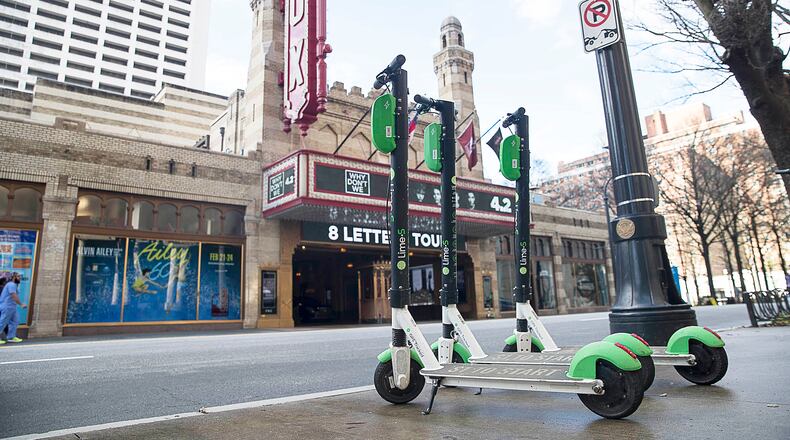Atlanta Mayor Keisha Lance Bottoms said Thursday that she is banning the nighttime use of rented electric scooters, an announcement made only days after the Atlanta metro area took the nation’s lead in the number of e-scooter related deaths, according to the available data.
Starting Friday the use of e-scooters and e-bikes is prohibited between the hours of 9 p.m. and 4 a.m. Scooter companies must disable the devices during those hours or risk losing their permits, city officials said.
On Tuesday, the metro area saw its fourth e-scooter related death in three months when Quineterry McGriff, a homeless man, ran a red light and was hit by a truck around 6:30 a.m. in East Lake.
“This nighttime ban, while we continue to develop further long-term measures, will ensure the safest street conditions for scooter riders, motorists, cyclists, those in wheelchairs and pedestrians,” Bottoms said in a statement.
The nighttime restriction is not a signal that the city eventually intends to do away with shareable electric scooters and bikes. It's a temporary first step toward a more careful approach of integrating them into the transportation network, officials said.
“We want as many people to be able to ride scooters at all times of day and night as possible,” said Planning Commissioner Tim Keane. “As we transition into a place where people are getting around on these kinds of things we have to, each step along the way, do what we can right now to ensure as much safety as possible.”
According to the National Association of City Transportation Officials, there have been at least 15 e-scooter related deaths in the U. S. since the devices were introduced in the Spring of 2017.
The association compiled the list by tracking media reports, and a spokesperson said that it may not be comprehensive because it’s not likely that every scooter-related death has been reported.
The first occurred in Washington D.C. last September, according to the list. The city of Atlanta didn’t have its first until May 17. But now Atlanta, in addition to the metro area, leads all cities with four fatalities.
Atlanta saw two more deadly wrecks in July, pushing it ahead of San Diego which has had two deaths.
During roughly the same three-month time period, five pedestrians were killed after being hit by cars, but there were no bicycle deaths resulting from collisions with vehicles, according to statistics provided by the Atlanta Police Department.
Two of the city of Atlanta’s three deaths happened after city police began enforcing an ordinance that forbids using the devices on sidewalks.
All of the e-scooter fatalities in the city resulted from accidents involving motor vehicles after 9 p.m. One was hit by a speeding SUV whose driver was charged with second-degree homicide by vehicle. Another was crushed when he fell underneath a Cobb County transit bus. And yet another died of head injuries after being struck by a hit-and-run driver.
“I don’t want to make excuses for these hit-and-run drivers,” said City Councilman Michael Julian Bond. “But it’s difficult to see them at night.”
Backed by billions of dollars of venture capital, the devices became a disruptive force in cities across the globe since introduction by Bird in Santa Monica in May 2017.
And in Atlanta, a city heavily reliant on cars, their introduction has been particularly jarring. Now they are forcing city officials to rethink their approach to mobility and speed up infrastructure changes aimed at accommodating alternatives to the automobile.
“The focus we need to have as a city is making it safe for everyone to be on the streets at all hours,” said Councilman Amir Farokhi.
Farokhi’s district, which includes Downtown, Midtown, Old Fourth Ward, Inman Park, Poncey-Highland, and Candler Park, has seen the largest proliferation of the devices since they first appeared in Atlanta in the summer of 2018.
In her announcement Thursday, Bottoms said she would soon unveil accelerated plans for changes to the city’s streets that create safer, dedicated spaces for cyclists and scooter riders.
Bottoms also said the city would revise its scooter selection process, pairing down the number of operators. Currently nine companies have permits to operate more than 12,000 of the devices, but less than half that number have been deployed.
Most of the permits expire in February.
“What we want to do is employ relatively inexpensive and quick actions that make safer spaces,” Keane said. He mentioned the possibility of erecting temporary protective barriers to create immediate bike lanes.
Nima Daivari, Lime’s Community Affairs Manager for the State of Georgia, said the nighttime prohibition was a reasonable temporary measure. Lime is a shareable e-scooter company with devices in 100 cities, 25 countries and five continents.
“We don’t think anyone could have anticipated the explosion of micro-mobility across the globe,” he said.
About the Author
Keep Reading
The Latest
Featured




